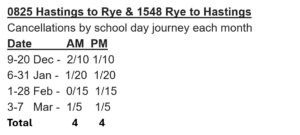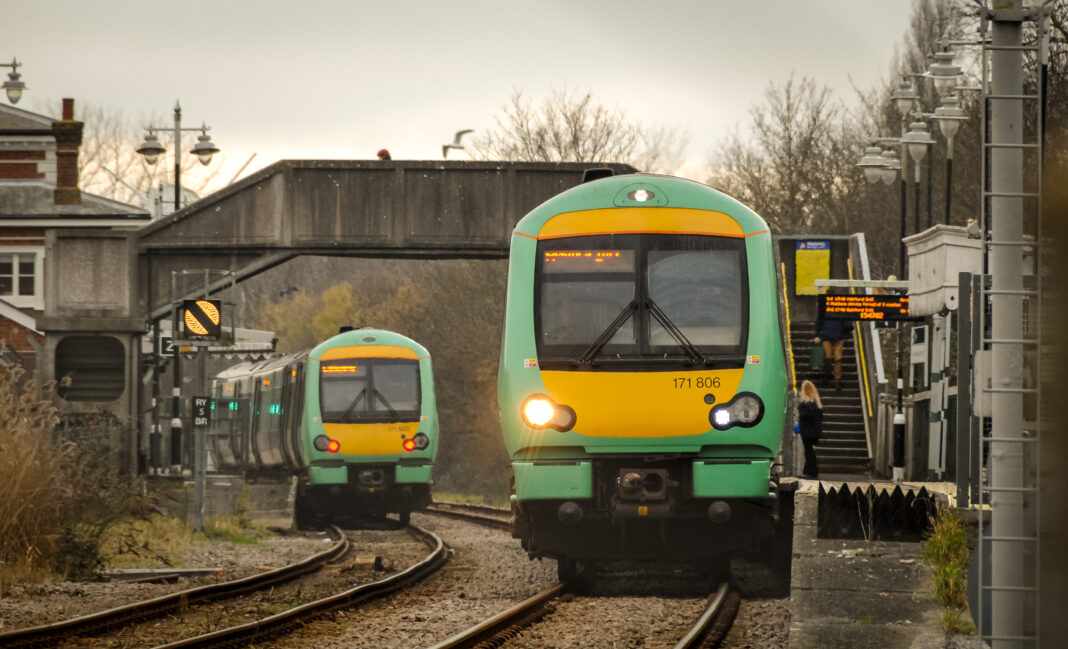Rye College students will no longer have to pay for an extra bus fare if their train is cancelled – saving at least £3 for each journey. Chris Fowler, the operations manager for Southern Trains, made the decision as part of an interview with Rye News Press Club students who challenged the rail company’s reliability and punctuality.
Using their own data on the main morning school train from Hastings to Rye arriving at 8.47am and the return service at 3:48pm in the afternoon, the students found eight trains were cancelled over a 50 day period up until the beginning of March. The cancellation rate of almost ten per cent was also checked against data on the On Time Trains website. There have been no cancellations affecting school services for the last month.
Bel, Audrey, Hannah and Ethan from the Rye News Press Club interviewed Chris Fowler on Teams last month to find out why there were so many cancellations. He told them the Marshlink rail line is a challenging one to run. “We typically don’t allow our trains to run too late, we’ll cancel them instead because of the complexity of having a single line. One train going in one direction will get in the way of a train coming in the other direction which is not typically true elsewhere on the network.”
Cancellations

Pressed further on the causes behind the cancellations, Chris Fowler explained some of the reasons: “One of your most recent ones was because the conductor got stuck in traffic, so train crew is one of them along with signal failures, points failures, and problems with the infrastructure. Network Rail maintain the track and signals and they have a rolling programme of work which also impacts your line, but what generally comes up on the board at the station is staff shortages. We’ve recently reworked some of the ways conductors work at the Eastbourne depot to build a bit more resilience into that roster.”
Further changes were unlikely, he told the students. “Most of the south east is an electric railway, the Marshlink Line is diesel only, with badly aging diesel rolling stock of which there is a national shortage plus the rail industry has a target to reach net zero by 2050. We’re not able to run more trains here. I’m really hoping there will be less cancellations in the future.”
The students also wanted to know why no replacement buses were laid on when their school trains were cancelled. He told them buses were in short supply. “At the times you’re travelling all the local bus services are contracted out to do school runs so there are no additional buses free for us. Also they come from a long way away like Tunbridge Wells or Ashford.”

No replacement buses
The lack of replacement services meant pupils having to pay for a bus ticket on top of the rail fare they had already paid – an additional £3 per journey. Chris Fowler had some good news for Rye College students. “What I’ve asked my team to do is to make sure whenever one of those four trains is cancelled an automated alert will display to my team so they can ensure ticket acceptance is in place. That would mean your rail ticket can be used on
the 100 and 101 buses, and if for any reason the the message hasn’t got through to the bus driver and they refuse to take your rail ticket, we will reimburse your bus ticket.”
He agreed to look into concerns from students from further afield, like St Leonards, without a direct bus route.

Fare increases
The Press Club students also challenged Southern Trains on the cost of tickets saying fares had increased significantly with no improvement in services. Could there be a reduced fare for students? No said Chris Fowler. “I think that has been looked at before. Ticket fares are regulated and generally follow inflation. It costs a lot of money to run the railways because there is a lot of fixed infrastructure and a lot of staff.”
The wide ranging discussion ended with concerns the ticket office closed early on many occasions during the winter, leaving students with nowhere to wait in the cold for delayed trains. Chris Fowler acknowledged the issue but said improvements had been made. “The station team told me they were really sorry they had some staff shortages recently, but they are back up to full staffing so you shouldn’t be seeing that again.”
The Rye News Press Club will be reporting further on the future of the Marshlink route, it’s electrification, and plans to reach net zero. Since being interviewed by the Rye College students Chris Fowler has been appointed managing director for GTS, the future operator of the Elizabeth Line through London.
Thanks to the team at the Rye News Press Club at Rye College for their report. We’ll be hearing more from the young reporters next term as they set the agenda with a mix of news reports and features.
Image Credits: Chris Lawson , Southern Trains .



